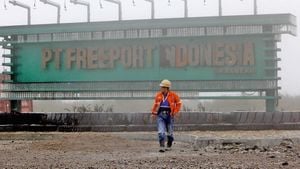Germany has experienced a significant political shift following the elections held on February 23, 2025, with the conservative Christian Democratic Union (CDU), under the leadership of Friedrich Merz, winning approximately 29% of the votes. This victory has cleared the way for what is expected to be Merz’s candidature for Chancellor after the exiting of Olaf Scholz, leader of the Social Democrats (SPD). Meanwhile, the far-right Alternative for Germany (AfD) has achieved historic results, coming second with around 20% of the total votes, marking its highest support since the end of World War II.
This election, characterized by the highest voter turnout since the reunification of Germany—84%—demonstrates shifting sentiments within the electorate. While the CDU has returned to power, the loneliness of the election's political climate has revealed pressing issues surrounding immigration and economic stability, which have reportedly dominated campaign discussions.
Friedrich Merz, aged 69, has re-emerged as the face of conservative politics after more than ten years away from the political arena, having led the CDU since 2022. His approach aims to revive the German economy following hardships encountered during Scholz's administration. Merz attributed Scholz's failures to stewardship during what he called one of the most severe economic crises since the post-war era, leading him to criticize, 'You leave the country mired in one of the largest economic crises of the post-war history.'
Conversely, the SPD has suffered its worst electoral outcome, securing only 16.5%—the lowest percentage recorded since the party's formation. Scholz, expressing disappointment, labeled the results as 'bitter' and confirmed he would not engage in coalition talks for control of the new government.
Both the CDU and SPD experienced shifts within their traditional voter bases. Research indicated women favored the CDU, attributing 27% of votes to them, whereas the SPD and AfD each garnered only 17%. For young voters aged 18 to 24, the Left Party (Die Linke) emerged as the most favored, attracting 25%. Further complicate political dynamics, the Green Party achieved around 12% of votes, moving forward with efforts to assume legislative responsibility if invited to collaborate with the leading party.
Avecerated by the growing support from dissatisfied voters, the AfD under Alice Weidel has captured national attention as they appear ready to stake their claim for governmental influence. Weidel stated, 'We are offering our hand to enter the government and fulfill what we believe is the will of the people'. Yet, Merz has remained adamantly opposed to entering any coalition with AfD, insisting, 'We will not form any alliance with you.' If these political currents are sustained, the AfD could play a formidable role as the dominant opposition force.
Despite the strong performance of the AfD*, some traditional parties, including the Free Democrats (FDP), faced challenges securing representation, with preliminary results indicating if they did not exceed the required 5% threshold, they would remain out of the Bundestag. Some early projections suggested their defeat might leave the CDU with fewer coalition options.
Merz expressed urgency during post-election statements, indicating the need for swiftly establishing government structures. 'The world is not waiting for us,’ he said during the celebrations at the Konrad-Adenauer-Haus, underscoring the importance of coalition negotiations. He mentioned he would maintain dialogue with other parties, including possible talks with the SPD and the Greens, to construct working coalitions.
Scholz's exit from power positions the SPD to reassess its strategy moving forward. The party's historical significance may be jeopardized if they fail to rebound from this loss. Current socio-political pressures in Germany call for serious self-reflection and strategic repositioning to avoid diminishing relevance, mirroring trends observed with social democratic parties across Europe.
Within the backdrop of rising neurological discontent, traditional parties are challenged to unify under clear agendas. This dilemma exposes the need for prioritizing issues pertaining to economic stability, immigration reform, and societal equity. A nationwide sentiment appears to favor action over long-term deliberations.
Many Germans expressed concerns about the AfD's ascent to power, fearing the repercussions for underrepresented communities, particularly immigrants, and minority groups. A sentiment echoed by activists is the possible danger of regressing social rights won over decades. It has stirred various civil demonstrations calling for immediate action against the rising tide of right-wing populism. Upcoming coalition negotiations are anticipated to be intensive as parties seek to bridge significant ideological divides.
The political discourse remains tense as coalition discussions commence, with leaders from across the spectrum intended to engage effectively to navigate the expected challenges as conservatives prepare to lead Germany through what promises to be tumultuous national and international conditions.



